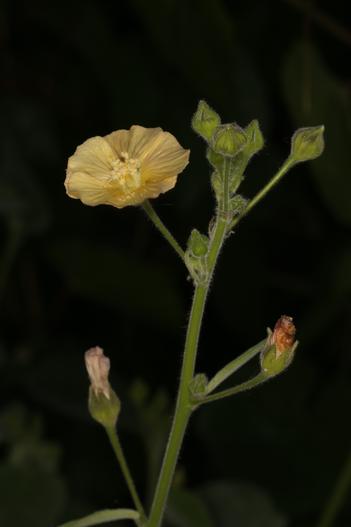Indian Anoda
(Anoda abutiloides)
Indian Anoda (Anoda abutiloides)
/
/

jcowles
CC BY 4.0
Image By:
jcowles
Recorded By:
Copyright:
CC BY 4.0
Copyright Notice:
Photo by: jcowles | License Type: CC BY 4.0 | License URL: http://creativecommons.org/licenses/by/4.0/ | Occurence ID: https://www.gbif.org/occurrence/4527965184 | Publisher: Inaturalist |







Estimated Native Range
Summary
Anoda abutiloides, commonly known as Indian Anoda, is an annual herb native to the Southwestern United States and Mexico, where it is typically found in riparian zones, scrublands, and disturbed areas. It can grow to a height of 5-6 feet (1.5-1.8 meters) and a width of 2-3 feet (0.6-0.9 meters), with a bushy habit and an open form. The plant features heart-shaped leaves and bears showy, yellow, hibiscus-like flowers during the summer and fall months, which can add a splash of color to garden settings.
Indian Anoda is valued for its drought tolerance and its ability to thrive in a variety of soil types, although it prefers well-drained soils. It is often used in xeriscaping, wildflower gardens, and as a filler in mixed borders due to its ease of maintenance and attractive blooms. While it is not commonly found in cultivation, it can be an interesting addition to gardens in arid regions. Gardeners should note that it may require staking due to its height. It is not known to have significant disease or pest problems, but its size and form can become unruly if not managed.CC BY-SA 4.0
Indian Anoda is valued for its drought tolerance and its ability to thrive in a variety of soil types, although it prefers well-drained soils. It is often used in xeriscaping, wildflower gardens, and as a filler in mixed borders due to its ease of maintenance and attractive blooms. While it is not commonly found in cultivation, it can be an interesting addition to gardens in arid regions. Gardeners should note that it may require staking due to its height. It is not known to have significant disease or pest problems, but its size and form can become unruly if not managed.CC BY-SA 4.0
Plant Description
- Plant Type: Subshrub, Herb
- Height: 2-3 feet
- Width: 2-3 feet
- Growth Rate: Moderate
- Flower Color: Yellow
- Flowering Season: Summer, Fall
- Leaf Retention:
Growth Requirements
- Sun: Full Sun, Part Shade
- Water: Low
- Drainage: Medium
Common Uses
Low Maintenance, Rock Garden
Natural Habitat
Native to scrublands, disturbed areas, and less commonly to pristine riparian zones in the Southwestern United States and Mexico
Other Names
Common Names: False Indian-Mallow
Scientific Names: , Anoda abutiloides, Sida caudatifolia, Anoda urophylla, Anoda caudatifolia,
GBIF Accepted Name: Anoda abutiloides Gray ex S.Watson